
Keno Don Hugo Rosa, known as Don Rosa, is an American comic book writer and illustrator known for his Disney comics stories about Scrooge McDuck, Donald Duck, and other characters which Carl Barks created for Disney-licensed comic books, first published in America by Dell Comics. Many of his stories are built on characters and locations created by Barks; among these was his first Duck story, "The Son of the Sun" (1987), which was nominated for a Harvey Award in the "Best Story of the Year" category.

Harvey Forbes Fierstein is an American actor, playwright, and screenwriter, known for his distinctive gravelly voice. He is best known for his theater work in Torch Song Trilogy and Hairspray and film roles in Mrs. Doubtfire, Independence Day, and as the voice of Yao in Mulan and Mulan II. Fierstein won two Tony Awards, Best Actor in a Play and Best Play, for Torch Song Trilogy. He received his third Tony Award, Best Book of a Musical, for the musical La Cage aux Folles and his fourth, the Tony Award for Best Actor in a Musical, for playing Edna Turnblad in Hairspray, a role he revived in its live television event, Hairspray Live! Fierstein also wrote the books for the Tony Award-winning musicals Kinky Boots, Newsies, and Tony Award-nominated, Drama League Award-winner A Catered Affair. He was inducted into the American Theater Hall of Fame in 2007.

The mandarin duck is a perching duck species native to the East Palearctic. It is sexually dimorphic, with males showing a dramatic difference from the females. It is medium-sized, at 41–49 cm (16–19 in) long with a 65–75 cm (26–30 in) wingspan. It is closely related to the North American wood duck, the only other member of the genus Aix. 'Aix' is an Ancient Greek word which was used by Aristotle to refer to an unknown diving bird, and 'galericulata' is the Latin for a wig, derived from galerum, a cap or bonnet. Outside of its native range, the mandarin duck has a large introduced population in the British Isles and Western Europe, with additional smaller introductions in North America.

The Aylesbury duck is a breed of domesticated duck, bred mainly for its meat and appearance. It is a large duck with pure white plumage, a pink bill, orange legs and feet, an unusually large keel, and a horizontal stance with its body parallel to the ground. The precise origins of the breed are unclear, but raising white ducks became popular in Aylesbury, Buckinghamshire, England, in the 18th century owing to the demand for white feathers as a filler for quilts. Over the 19th century selective breeding for size, shape and colour led to the Aylesbury duck.

"The Ugly Duckling" is a Danish literary fairy tale by Danish poet and author Hans Christian Andersen (1805–1875). It was first published on 11 November 1843 in New Fairy Tales. First Volume. First Collection, with three other tales by Andersen in Copenhagen to great critical acclaim. The tale has been adapted to various media, including opera, musical, and animated film. The tale is an original story by Andersen.
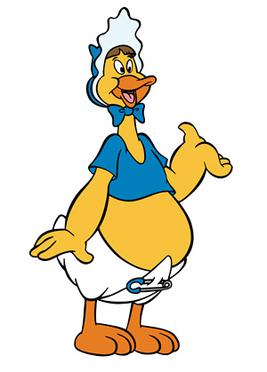
Baby Huey is a gigantic and naïve duckling cartoon character. He was created by Martin Taras for Paramount Pictures' Famous Studios, and became a Paramount cartoon star during the 1950s. Huey first appeared in Quack-a-Doodle-Doo, a Noveltoon theatrical short produced and released in 1950.
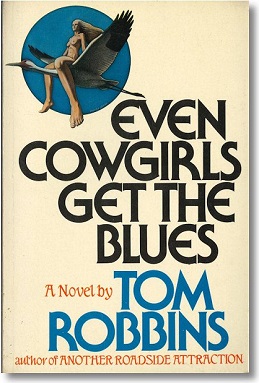
Even Cowgirls Get the Blues is a 1976 novel by Tom Robbins.

Make Way for Ducklings is an American children's picture book written and illustrated by Robert McCloskey. First published in 1941 by the Viking Press, the book centers on a pair of mallards who raise their brood of ducklings on an island in the lagoon in the Boston Public Garden. It won the 1942 Caldecott Medal for McCloskey's illustrations, executed in charcoal then lithographed on zinc plates. As of 2003, the book had sold over two million copies. The book's popularity led to the construction of a statue by Nancy Schön in the Public Garden of the mother duck and her eight ducklings, which is a popular destination for children and adults alike. In 1991, Barbara Bush gave a duplicate of this sculpture to Raisa Gorbacheva as part of the START Treaty, and the work is displayed in Moscow's Novodevichy Park.

Yakky Doodle is a fictional anthropomorphic cartoon duck created by Hanna-Barbera Productions for the television series The Yogi Bear Show. Yakky's name is a spoof of "Yankee Doodle".

Domestic ducks are ducks that have been domesticated and raised for meat and eggs. A few are kept for show, or for their ornamental value. Most varieties of domesticated ducks, apart from the Muscovy duck and hybrids, are descended from the mallard, which was domesticated in China around 2000 BC.

The Tale of Jemima Puddle-Duck is a children's book written and illustrated by Beatrix Potter and first published by Frederick Warne & Co. in 1908. The protagonist Jemima Puddle-Duck first appeared in The Tale of Tom Kitten.

The Rouen is a heavyweight breed of domesticated duck. Rouens are raised primarily for meat, exhibition, or as general purpose ducks. Since they are not prolific egg layers, Rouen ducks are most commonly bred for their meat. The breed originated in France sometime before the 19th century.
Henry Cole is an American author and illustrator of children's books. He has illustrated several books for many authors including Julie Andrews Edwards, Lester Laminack, Erica Perl, Margie Palatini, Alyssa Capucilli, Harvey Fierstein, and Pamela Duncan Edwards.

Olivia is a fictional pig character in a series of children's picture books written and illustrated by the late Ian Falconer, the first entry of which was published in 2000. An animated television series, Olivia, inspired by the character premiered in 2009.

An Awfully Beastly Business is a series of fantasy books for children published between 2008 and 2011. Written collaboratively by David Sinden, Matthew Morgan, and Guy Macdonald and illustrated by Jonny Duddle, the series follows the adventures a werewolf named Ulf. He and many other endangered beasts live under the protection of the Royal Society for the Prevention of Cruelty to Beasts (RSPCB), a society founded by the late Professor Farraway. Ulf is an RSPCB apprentice who works with his companions the giant Orson, the fairy Tiana, and the veterinarian Dr. Fielding to prevent the antagonist poachers from capturing the beasts.
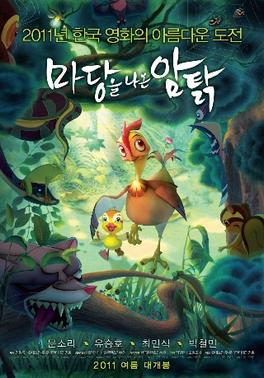
Leafie, A Hen into the Wild, also called Daisy, A Hen into the Wild in English-speaking countries, is a 2011 South Korean animated drama film which depicts the freedom, will and instinctive motherly love of a hen as she raises an adopted duckling. The film made box office history by drawing over 2.2 million viewers, the largest audience for a home-grown animated film in South Korea. It also received widespread critical acclaim upon release.
Allan Woodrow is an American author of children's literature, mostly middle grade fiction. His books include The Curse of the Werepenguin, Class Dismissed and The Pet War. His first book, the Rotten Adventures of Zachary Ruthless, debuted in 2011 and was published by HarperCollins Children's Books.
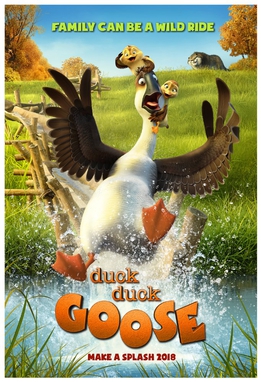
Duck Duck Goose is a 2018 animated adventure comedy film directed by Chris Jenkins, who wrote the original story and co-wrote the screenplay with Rob Muir, Scott Atkinson, and Tegan West. It stars the voices of Jim Gaffigan, Zendaya and Carl Reiner. An international co-production between the United States, China and the United Kingdom, the film was released in China in March 2018 with an intended North American theatrical release date of April 2018; it was quietly pulled from the schedule following the closure of Open Road Films and was made available on Netflix on July 20, 2018.
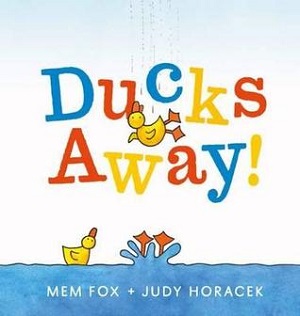
Ducks Away! is a 2016 children's picture book written by Mem Fox and illustrated by Judy Horacek. Published by Scholastic Inc., It is about a mother duck and her five ducklings attempting to cross a bridge, one by one, and fall off the bridge into the river below. The duck becomes more and more agitated until she, with the last of her ducklings dropping into the water and their encouragement, decides to follow them.
















